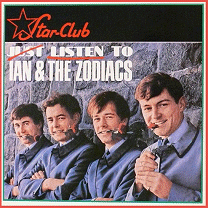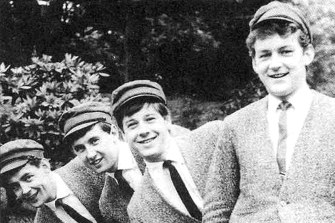Sixties
City presents
a wide-ranging series of
articles on all aspects of the Sixties, penned by the creator of the iconic
60s music paper Mersey
Beat
|
Sixties
City presents
a wide-ranging series of
articles on all aspects of the Sixties, penned by the creator of the iconic
60s music paper Mersey
Beat
|
|||||
|
| The group
first formed as The Zodiacs in 1958, consisting of members of the school
orchestra at St Mary's College, Crosby. They comprised Pete Pimlett, guitar;
Dave Lovelady, drums; Pete Griffiths, lead guitar and Jerry Garaghan, piano.
When they arrived at the Savoy Hall, Waterloo, seeking an audition, promoter
Brian Kelly told them they could go on stage for half an hour if they had
a singer. They told him they didn't have a vocalist and he pointed out a
member of the audience, John Kennedy, and said "He's a singer". Kennedy
agreed to join them straight away, but his choice of numbers was different
to the trad jazz style of music they had been used to performing, so he
replaced numbers such as 'Tin Roof Blues' with 'Blue Suede Shoes'. The following
year there were personnel changes. They were joined by Ian Edwards, former member of The Deltones, on vocals/guitar and had trimmed to a quartet. The other members were Pete Pimlett, Dave Lovelady and Pete Wallace on bass. For the next year they built a strong reputation in the Crosby/Litherland area and became resident group each Wednesday and Saturday at The Jive Hive in Crosby. Tragically, lead guitarist Pete Griffiths had been killed in an accident when travelling by motorbike to a gig at The Jive Hive. By 1961 there were other major changes in the band, with only Ian and Pete Wallace remaining from the original quartet. The other members were Cliff Roberts on drums, Charlie Flynn on bass/vocals and Geoff Bethell on piano. The group began appearing regularly at the Orrell Park Ballroom and had taken on the ballroom manager, Ralph Webster, as their personal manager. They were one of the bands who recorded for the Oriole mobile unit at the Rialto Ballroom and were featured on the hit album 'This is Mersey Beat', performing 'Locomotion', 'It Ain't Necessarily So' and 'Let's Turkey Trot'. They also recorded a single for Oriole, their cover of a Motown number 'Beechwood 4-5768' (what Mersey Beat newspaper referred to as the Mersey-Motown sound, when Liverpool groups adopted Motown material to their own style). It was issued in 1963 on Oriole CB 1849. By May 1964 they had decided to rid themselves of the pianist, turned professional and reverted to being a quartet, auditioning Geoff Bamford of The Memphis Three to replace Cliff Roberts on drums. |
 |
 |
They appeared
a number of times at The Cavern and Ian was to recall, "Paul, George and
John were always practicing in The Cavern's band room. They didn't come
with us to The Grapes and that's probably why they made it and we didn't.
We spent too much time in The Grapes". (The Grapes, of course, was
the pub in Mathew Street where groups spent a great deal of time during
Cavern breaks). The group then travelled to Germany where they had been booked for one month, but decided to stay, remaining there for three years. They built up a strong reputation in Germany at the cost of losing out on activities back home on Merseyside. Ian & The Zodiacs were now managed by Manfred Weissleder, owner of the Star Club, who promoted them in the various Star Clubs he was opening in other parts of Germany. Edwards, Flynn and Wallace had now been joined by Joe Walsh, a former member of The Lee Curtis All Stars, on drums. Ian's friend Tony Crosby recalled that Ian told him about the time he broke a string just as he was about to go on stage at the Star Club: "Chuck Berry lent Ian his guitar and Chuck Berry is a tall man. Ian was not and the guitar came down to Ian's knees. He had to sit down on the stage to play it until he had time to adjust the strap". When their van was involved in a road accident, Wallace and Walsh both left the group and, from September 1966, Ian and Charlie were joined by Arthur Ashton on lead guitar and Freddie Smith on drums. Arthur, Billy J. Kramer's cousin, had formerly been a member of Billy's original group The Coasters while Freddie had been a member of The Bobby Patrick Big Six. The group were extremely successful in Germany, recording several albums, including three albums for the Star Club label: 'Star Club 7', 'Just Listen To Ian & The Zodiacs' and 'Locomotive!' They also recorded two Beatles cover albums under the name The KoppyKats. The first was the double album 'The Beatles Beat', issued by Fontana in 1965 and the second was 'Gear Again', issued on the Wings label. They had hits in Germany and America, but not in Britain. |
| Their British
releases, following their Oriole debut in 1963, were 'Just The Little Things'
c/w 'This Won't Happen To Me' on Fontana TF 548 in 1965; 'No Money, No Honey'
c/w 'Where Where You' issued in 1966 on Fontana TF 708 and 'Wade In The
Water' c/w 'Come Along Girl' issued on Fontana TF 753 in 1966. Another anecdote
recalled by Tony Crosby referred to a trip to America: "The Zodiacs had
a record starting to move in the American charts and went there to promote
it. They couldn't play because they didn't have their 'green cards', so
had to wave from the stage as their record played in the background".
Tony is probably referring to their single 'The Crying Game' which sold 250,000 copies in America and actually reached the No.1 spot in Texas. Tony Coates replaced Charlie Flynn, who had joined The Connoisseurs, and the group continued in Germany until July 1967 when Ian's wife was hospitalised. He returned to Liverpool to be with her and the group disbanded. Ian was later with The Fourmost and The Connoisseurs for a time and reformed Ian & The Zodiacs on a number of occasions. Ian died at Litherland Hospital on Tuesday 23rd October 2007 of a heart attack. He was 64 years old and is survived by his wife Esther and their two sons. |
 |
|
Article
Text
UK
web hosting by
|